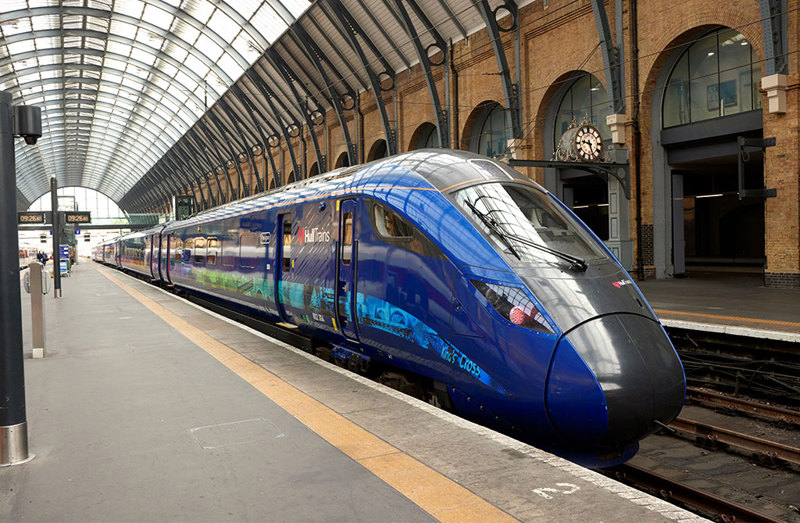
FirstGroup says it has “clear plans to navigate the evolving market”, as it presented an upbeat set of half-year results to shareholders.

FirstGroup says it has “clear plans to navigate the evolving market”, as it presented an upbeat set of half-year results to shareholders.
Among changes in both its rail and bus businesses due to nationalisation and franchising respectively, it eyes growth in open access rail, plus portfolio diversification and margin improvement in bus, to fill the forthcoming loss over the next three years of its three Department for Transport National Rail Contracts (NRCs).
Rail (including open access) and bus operations account for a 60-40 profit split.
In 2021, NRCs accounted for the majority of group profits. This is now down to 21%.
In contrast, in the next few years First’s growing open access rail will treble from one billion to three billion seat miles a year.
Expansion continues in First Bus, which was re-launched in mid-December, when it also announced its re-entry to the London contracted market (which it exited in 2013) with the purchase of the west London- based French-owned RATP.
Announcing an interim dividend of 1.7p per share (costing £24 million) and a £50m share buy-back programme, the company is on a stronger footing than for much of the past decade.
Earnings per share are “expected to be maintained” in the full year for 2026, reflecting growth in open access rail and First Bus.
On adjusted revenues of £649.6m (up 2.3%) for the half-year to September 28, adjusted pre-tax profit fell by 3.7% to £70.8m. This is largely due to higher variable NRC management fees in the previous year
First says it will remain “focused on operational delivery” in First Rail, where there is an opportunity to earn greater fees for improved delivery. It says it is currently at two-thirds of the maximum available.
With the group’s exit from international rail and bus markets over the past decade, its UK rail and bus businesses provide its sole revenues. Its final overseas activity saw it discharge its pension obligations for its former USA Greyhound bus operation, earlier this year.
Revealing a 7% increase in First Rail passenger journeys for the half-year (to 132.2 million), the company points to revenue from its Lumo and Hull Trains open access operations rising by 12% to £51.9m. Adjusted operating profit rose by 15% to £18.1m.
Along with a contract that started in June to operate the TfL London Cable Car, First points to the acquisition of new open access rights for its Euston-Stirling service as evidence of its growth.
While its NRC management fees are relatively small compared with revenue, First Rail’s capital exposure is described as “light”, with any capital expenditure
required by the DfT operators “fully funded” under the NRCs.
It adds that open access financial performance “reflects strong demand” and “some inflationary increase in fares”, offsetting “slightly higher” costs.
Operating profit from its DfT NRCs was down by 10.8%, from £54.9m to £44.1m. While First collected £2.3 billion in revenue in the half-year (up from £2.2bn the previous year), it passed £1.8bn of this directly to the DfT as fares revenue.
Overall, financial performance of First Rail is “anticipated to be slightly ahead” of prior expectations, reflecting open access growth and a normal level of DfT variable fees - currently running at two-thirds the maximum available.
Looking ahead, as the DfT NRCs transition to public ownership, First Rail anticipates a cash inflow of £80m over three years from April 2025.
While it owns the Great Western Railway business outright (delivering it the full management fee if targets are met), for South Western Railway and West Coast Partnership (Avanti) it has a 70% share of the business. MTR and Trenitalia are the 30% holders respectively. GWR also operates the open access Heathrow Express on behalf of Heathrow Airport Ltd.
Management fees comprise a fixed annual sum, with a variable ‘bonus’ dependent on performance. This is scored against three categories evaluated bi-annually by the DfT: Operational performance (including punctuality); customer; and financial measures.
While First Rail has not revealed the individual performance fees received, its total management and performance fees were £23.7m (down from £34.7m the previous half-year), from a total potential of £52.6m. Cash received from management fees is a year in arrears.
First Rail National Rail Contract management fees
| Fee | SWR (70% share) | GWR | WCP (70% share) |
| Annual fixed | £3.3m | £6.9m | £3.6m |
| Variable fees, potential | Up to £9.9m | Up to £17.8m | Up to £11.1m |
| Total fee potential | £3.3m-£13.2m | £6.9m-£24.7m | £3.6m-£14.7m |
First Rail anticipated Open Access growth
Applications approved
- Grand Union track access agreement acquisition. London Euston - Stirling: (500m seat miles); current track access agreement: May 2025 - May 2030
- Grand Union track access agreement acquisition. London Paddington – Carmarthen (400m seat miles); current track access agreement: December 2027 – December 2037
Applications in progress
- Hull Trains: London - Sheffield service application (56m seat miles). Application being reviewed as part of East Coast Mainline (ECML) December 2025 timetable review
- Lumo: Rochdale - London service application (324m seat miles); track access application start date of December 2027
- Lumo: Edinburgh-Glasgow extension application (54m seat miles)
- Lumo: Paignton – London Paddington service application (350m seat miles)
- Additional paths on Lumo and Hull Trains applications (123m seat miles)
- Expansion of Lumo services to ten car operations where required (449m seat miles)
Login to continue reading
Or register with RAIL to keep up-to-date with the latest news, insight and opinion.


















Login to comment
Comments
No comments have been made yet.